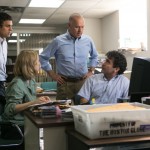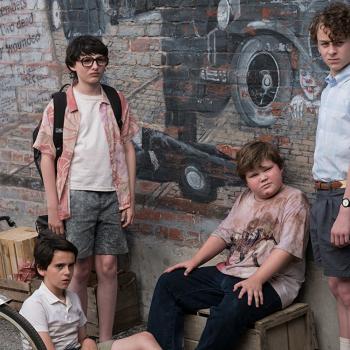The next important conflict in the film is that between Morten and Peter. Decades have been wasted in a religious feud of ideas, in intricacies that have nothing to do with love and following of Christ, in spiritual pride. While theology is indeed important, sometimes we can elevate our precise articulation of it to a position of idolatry, replacing God with our precise words about Him. I have seen many Christians break into smaller and smaller groups, convinced that only their small group truly has the truth, pridefully tearing down their fellow brothers and sisters in Christ, missing the good that they could be doing and the Word that they could be proclaiming together. One may ask which miracle in Ordet is the most important; I wonder if the eventual healing of the relationship between Morten and Peter (in response to Christ’s words that before we come to worship, we must mend our relationships with our fellow Christians) is actually the bigger miracle.
Another central conflict of the film is that of Inger’s sudden plunge into dangerous childbirth; her death and the death of her baby are predicted by a still-mad Johannes, who wanders through the scenes, ghostly and distanced, constantly reproaching all for their lack of faith. I found Johannes’s words rather shocking just prior to her death: “If you had believed in me, this would not have happened. Now I am powerless.” Of course, Johannes is not himself God, but the film wants us to see him as a Christ figure in some ways. And the film is suggesting to us that God has a certain (perhaps self-imposed) powerlessness if people do not have faith and cooperate with Him in believing prayer. I don’t believe in a God who is dependent on humans in order to do His will; God is not so chained. Yet I did find the constant reproaches to have more faith reminiscent of Jesus’s exhortations, “O you of little faith!”
In the end, there are three miracles. Johannes is healed; he makes eye contact again, is in his right mind, knows himself to be Johannes and not Jesus. But his connection to spiritual truth remains intact. The second miracle is the most shocking: Johannes believes that God can literally raise Inger from the dead, physically–not just her soul entering eternity (as the preacher suggests). When a child simply believes, Johannes is given “the Word that can make the dead come to life.” The heartbroken Mikkel, having had his love restored to him likewise has his faith restored to him. He sees that there is a God of miracles, present in the real world. The third miracle is the reconciliation that occurs between Morten and Peter.
What to make of all this strangeness? Well, I particularly like what the writers on the blog Film School Rejects said about this film; for all their disbelief in God personally, they stumble onto a profound truth: “Theology is something you find at the bottom of a casket or in a young girl’s belief — not in a book.” When Johannes tries to find faith in a book (even in Kierkegaard who embodies the experiential leap into the unknown of faith), he fails. When he experientially lives out the promises of God, he connects with faith. But perhaps the heroes we are meant to focus on are Inger, filled with unconditional love and steady trust in God, and her daughter, the child who dares to believe God is capable of bringing the dead literally to life again.
The second thing I take away from this film is the way in which it elevates a faith which is embodied. It focuses on the pastoral setting of a farm family. It shows us the beauty of the embodied love of Inger, drawing us far more than the sophistry of the town minister, the spiritual exhaustion of Morten, or the otherworldly prophesies of Johannes. Inger made me think of Christ, the incarnate One, the Word who has come near. It made me think of how unless the Word breaks into our physical world, it remains abstract and distant from us.
Acquarello writes, “A departure from the profoundly religious subtext of the Kaj Munk play from which the film is based, Dreyer’s adaptation of Ordet is tactile and sensual (especially evident in the intimate, extended sequence of Inger’s childbirth), a reflection of his practical concerns for the nature of human existence. By identifying with the nurturing, pragmatic Inger instead of the devout, but fragmented Johannes, Dreyer illustrates the need for balance and personal reconciliation between the body and the soul. In essence [in his films in general], Dreyer seeks to endow the spiritual (Jesus of Nazareth, Joan of Arc, Inger Borgen) with a texturality and voluptuousness that is often only associated with the corporeal.” Gone is the Platonic division between soul and body, gone is the demeaning of flesh. Here is the enobling of God’s presence in the physical world; here is His ability to renew that which is death dealing. Here is the hope of incarnation, the hope of resurrected life in a world made by the Creator and one day to be renewed.
The Word became flesh and made his dwelling among us. We have seen his glory, the glory of the one and only Son, who came from the Father, full of grace and truth.
–John 1:14, NIV
What do you think: Has most religion elevated the life of the soul above the life of the body? How could understanding God’s role as Creator and Recreator help to show the holiness of physical creation?
How would you define a miracle? Do you believe miracles are possible? What holds you back from trusting in the possibility of miracles? Would anything be capable or persuading you?
What do you think about the statement from Film School Rejects that “Theology is something you find at the bottom of a casket or in a young girl’s belief — not in a book.” Is there anything to this notion? Why or why not?
I look forward to hearing your thoughts! This was a complex, somewhat difficult film with which to begin. Having seen it, I am certainly conscious of how much I still need to learn and understand about it. This post has been a beginning.
——————-
Community discussion guidelines:
Because this is a Christian blog, the things I’m talking about will obviously be topics that people feel strongly about in one direction or another. Please keep in mind that this is a place for substantive, respectful, constructive conversation. All perspectives are welcome to discuss here as long as all can treat each other with kindness and respect. Please ignore trolls, refuse to engage in personal attacks, try not to derail the conversation into divisive rabbit trails, and observe the comment policy listed on the right side of the page. Comments that violate these guidelines may be deleted. Vulgar remarks may result in immediate blacklisting. For those who clearly violate these policies repeatedly, my policy is to issue a warning which, if not regarded, may lead to blacklisting. This is not about censorship, but about creating a healthy, respectful environment for discussion.
P.S. Please also note that I am not a scientist, but a person with expertise in theology and the arts. While I am very interested in the relationship between science and faith, I do not believe I personally will be able to adequately address the many questions that inevitably come up related to science and religion. I encourage you to seek out the writings of theistic or Christian scientists to help with those discussions.
———————-












